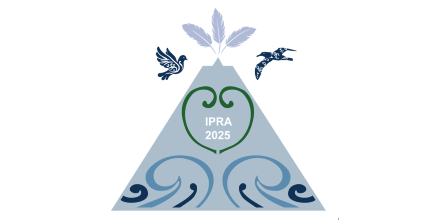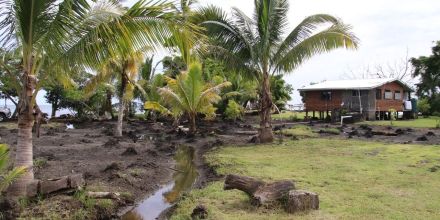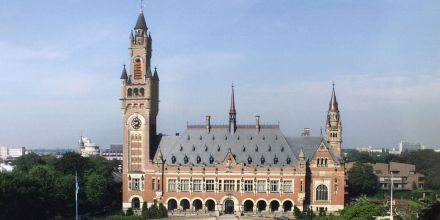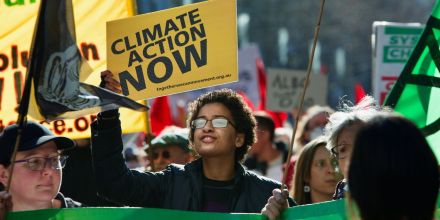Director's Keynote Address to IPRA 2025
Nov 2025 - News
The Director of the Toda Peace Institute, Professor Kevin P. Clements, gave the keynote address to the International Peace Research Association (IPRA) conference on Wednesday 5 November, 2025, recognised in New Zealand as Parihaka Day. The conference was held at Parihaka and New Plymouth in Taranaki, New Zealand. Here is the text of his address with a downloadable PDF here. “Reimagining Peace in a Fractured World” E ngā mana, e ngā reo, e ngā iwi o te ao. Tēnā koutou, tēnā koutou, tēnā koutou katoa—greetings to you all, people of many voices, lands, and lineages. Welcome to this land of mountains and rivers, where because of our anti-nuclear policy and Te Tiriti, there is, or should be, a living peace covenant between people and place. Because of all the Treaty work of the past 40 years and the anti-nuclear policy of the 1980s, peace is not an abstraction here; it is embodied in our culture and being. We want to be nuclear free and free of military alliances and we want to do justice to the partnership guaranteed in Te Tiriti. This peace covenant, however, is under threat at the moment because of our current government’s desire to reverse the positive decisions of the past—honouring the treaty. It’s also under threat because our Minister of Defence and Foreign Minister want us to move toward a closer military relationship with the US, thus putting our anti-nuclear status in jeopardy. This is a very sacred day for Taranaki Iwi as it commemorates the invasion of the peaceful Māori settlement of Parihaka by colonial forces in 1881, 144 years ago. It is a day of remembrance for the principles of peaceful resistance espoused by its leaders, Te Whiti o Rongomai and Tohu Kākahi. Parihaka’s resistance may have been one of the first cases of nonviolent challenge to colonial occupation. At this moment I would like us to remember my old friend Maata Whareoka who lived at Parihaka and was a great advocate for peace and nonviolence. Just as Māori honour their ancestors on occasions like this, I want to acknowledge the ancestors of IPRA and all that they gave to the formation of our field. Bert Roling (our first Secretary-General), Johan Galtung, Elise Boulding (and her WILPF colleagues), Kenneth Boulding, and John Burton. These five were formidable scholars and practitioners and wonderful networkers and organisers. They initiated the first IPRA Conference and were close mentors of mine. We stand on their theoretical and empirical shoulders. They were joined later by Adam Curle. Asbjorn Eide, Raimo Vayrynen, Chad Alger. Betty Reardon, Yoshi Sakamoto, and many others. All our IPRA ancestors developed their theories in the context of the Cold War but soon realised that there could be no peace without justice. This gave rise to a preoccupation with colonialism, post colonialism and development seen as liberation from all oppressive relationships. In response to these issues, IPRA developed a whole series of regional organisations to represent all corners of the world. We also developed many substantive commissions. During the 80s and 90s, we were challenged to work out how to generate justice between the Global South and the Global North. Many of the papers in this Conference are continuing this problematic as it’s critical to sustainable peace. At the same time, we haven’t lost sight of how to deal with direct violence. When the Cold War ended, attention was directed to the creation of independent nations in the Post-Soviet Space and how to deal with an upsurge of many violent internal conflicts. There were many successes in the 1990s as we developed theories and processes to manage and transform violent conflict. But the successes have now been superseded by a radical return to violent politics. The Russian invasion of the Ukraine marks a new low as does the Israeli genocide of Palestinians. Between 2024–2025, we now have 61 state-based armed conflicts in 36 countries, the highest number in over seven decades. While we are focused on Ukraine, genocide in Gaza, and the Sudan, there are many other violent conflicts that are generating millions of refugees, displaced persons and large numbers of civilian and military casualties—think Myanmar, Ethiopia, and the DRC among others. Unfortunately, the theoretical legacies of our ancestors do not seem capable of solving the very intractable conflicts of 2025. IPRA and its founders were able to develop theories that worked in the past because there was a liberal international rules-based order (albeit a biased order in favour of the West). In this order, it was possible to devise collaborative and rational solutions to the problems of the day. Regional and global institutions were not under attack and vilified as they are today. The United Nations was never able to fulfil its goals because of P5 dominance of the Security Council. But it was respected for its human rights and humanitarian work, and rational evidence-based solutions to wicked problems were encouraged and applied. None of our peace research ancestors could have imagined the chaos generated by the Trump 2.0 presidency. Nothing in our theory could predict what would happen when an extreme narcissist with sociopathic and psychopathic tendencies took control of the most powerful nation in the world, eliminated democratic checks and balances and became an elected despot. When insanity replaces rationality and the predictable is rendered unpredictable, our peace research theory and practice is severely challenged. Trump, unfortunately, is not alone and has encouraged autocratic populist movements all around the world. He also has an irresistible fascination with strong arm dictators. As the 2025 V-Dem Report notes, the world now has 88 democracies compared to 91 autocracies for the first time in over 20 years. Liberal democracies have become the least common regime type in the world, a total of 29 in 2024. Nearly three out of four persons in the world—72 per cent—now live in autocracies. This is the highest since 1978. This trend towards autocracy and despotism has been caused by and resulted in a merciless attack on freedom of expression and civil society organisations and activism all around the world. This is having a major negative effect on freedom of the press and the freedom of universities and dissenters all around the world to speak truth to power. I can’t recall a moment in my lifetime when so many political leaders (led by Trump himself) have made careers out of bald-faced lies. All of this means that many of our idealistic rational assumptions about the world, and how to solve problems non-violently have become subverted. We are now living in a world of misinformation, disinformation, lies and an unfortunate return to tooth and claw realism and geopolitics. We are gathering here in New Plymouth at a moment of deep global division, polarisation, and profound brokenness. Our world is being torn apart by war and displacement, inequality, ecological collapse, marginalisation, and distrust. Trump’s desire to eliminate diversity, equality, inclusion, care and kindness is having a very chilling impact on our common humanity. Negative authoritarian voices are negating the calls for dialogue, communication and nonviolent relationship building. Cynicism has become the easy refuge of the powerful and the powerless alike. Peace in 2025 seems to shimmer like a mirage just beyond our reach. There is much to generate despair. We can identify different parts of the peacebuilding puzzle but lack holistic vision. It’s easy to feel despondent and defeated but this is precisely the moment when peace research and peace practice matter most. In times of fracture, new light enters the cracks and catalyses new thinking. Our peace ancestors responded to their conditions by developing theory and practice suitable for their times. The challenge facing IPRA right now is how to respond positively to the bleak conditions we are confronted with. It's going to take all our brain power but more importantly our peaceful and moral imagination to think of new ways of promoting nonviolent solutions to structural and direct violence. In moments of disillusionment, I want to argue that imagination itself becomes an act of resistance. Elise Boulding, who gave so much to IPRA, was a firm believer in imaging and imagining a world without war. So, let’s think of ways in which we can imagine real alternatives to the fear-based politics of the present. To take this idea a little further, in an age of fear and violence the courage to envision other nonviolent ways becomes revolutionary. In the first place the reimagination of peace is to refuse despair and to be hopeful and courageous in the face of global challenges. Trump and his ilk like to generate paralysis in the face of existential challenges like climate change. We need hope to counter the fear and despair. Second, it's vital that peace is not seen as a distant utopia or a shaky ceasefire, but the active creation of justice, empathy, care and belonging in the here and now wherever we are. It demands a politics of kindness and much more attention to building peaceful relationships at the micro, meso and macro levels. Peace is not something given by the powerful, (especially not by the autocrats)—it is something grown, relationally and locally, through trust, truth-telling, personal and social transformation. Third, the reimagining of peace is to hear all the voices that have been too long ignored. We need to listen to the voices of all those who are unable to make ends meet in the Darwinian economies of the 21st century. But we also need to pay special attention to women peacebuilders (who are our future), indigenous guardians of the land, disillusioned youth, and all those displaced by violence and imminent climate catastrophe. The question we need to pose is: What would peace look like if they were at the table? Fourth, what would global security mean if it were not defined by realists, armies or alliances, but by the wellbeing of the most vulnerable? In Aotearoa, we are continually challenged and inspired by Te Tiriti o Waitangi—the Treaty that still calls this nation to live in partnership, justice, and shared authority. Fifth, from Māori thought, we learn whanaungatanga—the deep sense of relationality and belonging. This reminds us that peace is not merely the absence of war, but the presence of right relationships: between peoples, with the land, and with the future. It involves building strong, respectful, and reciprocal relationships that foster a sense of belonging, mutual obligation, and collective responsibility. This means that our wellbeing exists through positive rather than negative relationship. In South Africa, the concept of Ubuntu is also similar and critically important. It means that our welfare is intimately connected to the welfare of others. It means solidarity, compassion, respect, dignity and survival. This is the essence of peace: not control, but connection. That's why we must replace cultures of violence with cultures of peace. That's why peace education remains as important now as it was when we first started teaching peace in schools, universities and in the community. For over six decades, IPRA has stood as a beacon for those who believe that knowledge and empathy can change the world. Our founders, such as Adam Curle, imagined peace research as a tool of transformation—a means of dismantling the structures that sustain violence and of constructing the relationships that sustain life. Today, that mission is more urgent than ever. We must reimagine the role of scholarship itself—not as an ivory tower pursuit, but as an act of engaged care and compassion. IPRA has always been more than an association. It is a movement of conscience, a global network of scholars and practitioners who refuse to accept that violence is inevitable, that conflict must end in domination, or that peace is the privilege of the powerful. Our work must be decolonising, feminist, inclusive, ecological. It must listen more than it lectures, and we all need to accompany those in need without objectification and abstracted empiricism. The task is to ensure that our knowledge does not simply describe reality, but reshapes it. This conference comes at a very critical moment in global history. It is an invitation—to challenge and rethink everything we assume about peace and power. We need: To see security not as the ability to dominate, but the capacity to care and serve the interests of those who depend on us as well as those we might fear. To see power not as control over others but power with others and the development of shared responsibility for decision making. To see conflict not as failure, but an opportunity for nonviolent transformation of challenged and broken relationships. We must cultivate what Joanna Macy calls active hope—the kind of hope that rolls up its sleeves. Hope that listens, heals, and persists and hope that holds both grief and determination in the same hand. As we begin our time together, let’s remember that peace is not a destination but a process—a daily practice of love, empathy, courage, and imagination. Let us learn from each other’s research, but also from each other’s humanity. Let us leave this conference not only wiser, but kinder—more grounded, more daring, more ready to act. The NZ Māori poet Hone Tuwhare once wrote: “I can hear the sea breathing… I am the wave.” May we, too, be that wave—a global tide of compassion, creativity, and courage, flowing from Aotearoa to every fractured corner of the world. Kevin P. Clements 5 November 2025
Pacific Resilience Facility treaty set for signing in Honiara
Sep 2025 - News
After years of frustration trying to access climate finance, Pacific leaders are creating their own climate fund. The Pacific Resilience Facility (PRF) treaty is set to be signed and ratified today (10 September) at the Pacific Islands Forum Leaders Meeting in Honiara, after a decade in the making. It will become the Forum's first financial institution. The fund is going to be Pacific-led and is dedicated to improving community resilience in the region. Read the full story from RNZ International Pacific News Image: Transcend Oceania
Hiroshima Peace Declaration 2025
Aug 2025 - News
Dear Friends As the world remembers and marks the 80th anniversary of the dropping of atomic bombs on Hiroshima and Nagasaki, we at Toda Peace Institute urge you to read the statement by Mayor Matsui of Hiroshima who delivered this year’s Peace Declaration at the Hiroshima Peace Memorial Ceremony. The statement can be accessed here. A video of Mayor Matsui delivering the statement can be accessed here. In addition, a statement from the TPNW Scientific Advisory Group on 80 years of Nuclear Weapons can be accessed here. In peace, Kevin ClementsDirector, Toda Peace Institute Image: Charles Knowles / Wiki Commons
'From moral duty to legal obligation': Pacific church leader hails ICJ climate ruling
Aug 2025 - News
The leader of the Pacific Conference of Churches (PCC) says a landmark climate ruling from the world's top court is a significant win, but much more work is needed. PCC secretary-general Reverend James Bhagwan spoke to Pacific Waves about the decision, alongside Green Party MP Teanau Tuiono. Tuiono is the Green's Pacific People's spokesperson. Read the full story from RNZ/Pacific
World Court says countries are legally obligated to curb emissions, protect climate
Jul 2025 - News
The UN’s principal judicial body ruled that States have an obligation to protect the environment from greenhouse gas (GHG) emissions and act with due diligence and cooperation to fulfill this obligation. This includes the obligation under the Paris Agreement on climate change to limit global warming to 1.5°C above pre-industrial levels. The Court further ruled that if States breach these obligations, they incur legal responsibility and may be required to cease the wrongful conduct, offer guarantees of non-repetition and make full reparation depending on the circumstances. Read the full story from UN News here Image: Young people and students rallying and protesting against global warming - Christie Cooper/shutterstock.com




